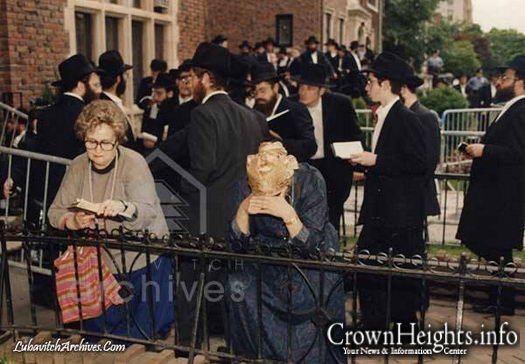
Op-Ed: After 20 Years, Just Scratching the Surface
Many have tried to understand why the Lubavitcher Rebbe was so influential in his lifetime, and why his memory continues to be potent and inspiring now twenty years after his passing. Having studied the Rebbe’s life in detail for many years, I think I have arrived at at least one possible answer.
It wasn’t just the fact that he never took a vacation, or that he showed tolerance and love for non-observant Jews where others had shown disdain. It wasn’t merely his warm smile, his penetrating blue eyes or his saintly demeanor.
It was simply this: He was able to find solutions where others saw problems. And not only in spiritual and religious matters; people flocked to the Rebbe in huge numbers with questions in business, medicine and science. He advised people in their careers and in their marriages. And we consistently hear reports of an almost instantaneous, firm decision-making, devoid of rumination or consultation with others. The Rebbe was successful because his sheer confidence was edifying, and his solutions were practical and effective.
From studying his early life, it is not inconceivable where he might have acquired some of these skills, since his story is one of a genius surrounded by geniuses. His father was both an accomplished Talmudist, ordained by the illustrious Rabbi Chaim Brisker, as well as an unusually creative Kabbalist who penned thousands of pages of dense discourses. We know that at a young age, the Rebbe corresponded with Rabbi Yosef Rosen, the Rogathcover Gaon, an Einstein-like figure whose conceptual system revolutionized Talmudic study; and it is not impossible the the Rebbe may have encountered Einstein himself, who was active in Berlin at the same time the Rebbe was a student there. At the very least we know that the Rebbe was taught by several Nobel prize winners, some the greatest minds that theoretical physics has known.
This broad range of exceptional geniuses, engaging with the Rebbe’s own formidable intellect, led to a level of insight that was unparalleled.
What is truly remarkable, though, is that the Rebbe managed to channel all this information from the realm of the abstract to the tangible. This feat of synthesis, integration and application was achieved through drawing on Chasidic wisdom.
The Chasidic masters consistently taught how the most sublime ideas might be practically useful to the ordinary person, even in lower states of mind. This was no small feat. Conventional wisdom teaches that if an idea is to enjoy wide consumption it needs to be dumbed down as much as possible, but the Chasidic Rebbes honed the art of application of the sublime, by drawing insightful parables and by employing language masterfully.
By the time he ascended to the Chabad leadership in 1950, the Rebbe had spent decades plunging into some of the greatest abstractions of the human mind, coupling that with a focus on making the information useful and applicable. That is why he was able to see solutions where others saw problems, because, as Einstein once said, you cannot solve a problem with the same level of thinking that created it. The Rebbe constantly demonstrated the ability to raise the discussion to a new paradigm where previously imagined boundaries of possibility were shed.
Chabad has grown exponentially over the last twenty years because the Rebbe’s advice to his followers has proven effective. But I get the sense that we are just scratching the surface. From the tens of thousands of pages of letters and sermons which he left us, there are so many more life-enhancing applications to be derived. It would probably not be an overestimate to say that Chabad is currently implementing a mere fraction of the Rebbe’s vision. If we could squeeze out some more of that wisdom and articulate it in the contemporary paradigm to a broad audience, the potential for more sustainable growth, and human well-being would be staggering.
Chaim Miller is the compiler of the Gutnick Chumash, which made over a thousand discourses of the Rebbe accesible to the layman. He recently authored the bestselling “Turning Judaism Outward,” the first full Biography of the Lubavitcher Rebbe.
This op-ed appeared in the Jerusalem Post on Gimmel Tammuz and is reproduced here with the author’s permission.















Moshe
What about the Rebbe being the Nasi Hador, the mashich of Shalsheles Chabad, an Ish Eloki?
yossi & berel, CH
Did the Rebbe actually encounter Einstein in Berlin?
If one does not have actual proof, why mention something that may or may not have taken place.What is gained or proven by mere speculation?
Berlin had about 4 million people before the war and about 160 thousand Jews at the time the Rebbe resided there.Chances that the Rebbe actually met and interacted with Einstein would not be very large
YMSP
He’s a very hartziger person. People don’t understand that he’s writing/speaking to the average person out there. The fact that he starts off with “one reason (for the Rebbe’s success) might be” shows that he knows that there’s more.
The Gemara in Sanhedrin says “dabar echod lador vein shnei debarim lador.” The Torah makes a differentiation between Moshe and Bnai Yisroel over and over again. The posuk “vayaaminu baHahsem uvMoshe avdoi” is the only time that Moshe Rabbeinu is mentioned in the Haggadah, and shows his difference.
We know that a Chosid trying to understand a Rebbe is like a hon a ben odom. We understand that the Rebbe’s kochos and those of a Nosi in general are different, as is clear from many, many explanations in Talmud as well. We understand that we’re the feet in the picture, the foot soldiers, but that the Nosi is in charge and the kochos come through him. But what Reb Chaim Miller is doing is fantastic in terms of getting people interested in the Rebbe and letting them learn lessons that the Rebbe worked hard to engrain in Klal Yisroel.
to number 2
presenting the Rebbe as the author’s biography is a distortion. It’s not the Rebbe, it’s an ideal of the writer’s imagination. It’s not mekarev anyone. Only by presenting the unadulterated Rebbe, can we really expect to make a difference.
YMSP
Not sure. For us, yes. But if this helps get one person interested in the Rebbe, it seems to be worth it (disclaimer – haven’t had time to read the book, and not a priority, but am getting the general gist),
There’s no question that mashpiim and whoever else should explain to bochurim that this is not who the Rebbe is, and that itself should lead to a discussion/explanation of what “Rebbe” means, al pi chassidus.
There are a lot of hyped/promoted people who are far more problematic that bochurim mistakenly look up to because of hype. (Have even heard this kind of crazy adoration regarding Matisyahu in his day.) R’ Chaim Miller is at least a good personal example and bochurim/yungelite need to be told that watered down stuff that lets outsiders appreciate Chabad is not meant for avoda pnimis. I’d be very surprised if R’ Chaim Miller would disagree.
This year I had a serious question, I called Reb Pinye Korf for advice, not some big name online. R’ Chaim Miller is a fine and hartziger sincere yid, and it seems that he would agree that his work was to reach only those who aren’t yet Lubavitch, which is a good thing. Being affected or getting hashkofos from anyone catering to online crowds is a problem (unless meant for Anash like Reb Yoel).
bosh
To attribute the Rebbe’s success to his mingling and studying with “Nobel prize winners” is a travesty. How about the Rav (Soloveichik), R’ Y. Hutner, who were “also” geniuses, sons of geniuses, who mixed with the same mileu, and also studied chassidus (see R’ Y. Hutner’s seforim, chock full of ideas from Chassidus), but didn’t come close to the Rebbe in advising people, etc.
To say that the Rebbe’s success is because of anything but that he was/is an Ish Eloki, is, or at least should be, from the perspective of every chossid, blasphemy.
R’ Miller, b’mchilas kvod toraso: I don’t come up to your ankles in learning and dissemination for the Rebbe’s Torah. I wish I did. But I do know that we can never really understand a Rebbe. Learn the maamorim in Samech Vov – aliba d’nafshei, from Parshas Bo through Parshas Pinchas. Neshomos of the Rebbeim are on a different plane. It’s not something we can ever relate to.
Enough psychoanalysing the Rebbe. Enough conjecturing. Enough speculating about something which is totally out of your league (and everyone else’s for that matter, including Rabbis Even Yisroel and Telushkin). Genug Shoin!
YMSP
If it makes one Litvisher Rov interested in Chassidus then it’s probably worth the entire effort. The problem is when chasidim take this in (it’s not meant for us and it is valuable introduction/assistance to hafotzo).
Btw “Hemshech” HaChodesh (Bo through Pinchas) has inyonim yesodiyim and it’s a chiyuv of every chosid to learn these (the Rebbe says in Kaitz Som LaChoshech – the last Tisha BAv Maamar that was mugeh that learning “Inyan HaOr” brings Moshiach), but to have a feel for what’s a Rebbe. the best are sichos 5710/11.
Telushkin, btw, is the leader of a Reform of Conservative temple (and this really should be more pointed out). He cares about the Rebbe on a basic level. At the end of the day, the Rebbe is Klal Yisroel’s Nosi, and whatever can be done to connect people to any aspect of the Rebbe is a good thing, as long as we recognize that this is an introduction for those who are still on the outside. Again, I certainly can’t speak for him or anyone else, but I’d be surprised if Reb Chaim Miller doesn’t agree with most of this assessment. .
Let the author speak.
No one is forcing you to read it. There are many who appreciate the writing.
Citizen Berel
No one has suggested banning the author from speaking in anyway, shape or form. Perhaps what you mean to say is “don’t criticize the author or his work, because some people like it,” which makes no sense, without your false rhetorical wrapping.
What the rebbetzin chaya mushka said
The Rebbe’s power
is in his emuna in hashem and the power of every yid etc.
its in the rebbetsin book
YMSP
Interesting, that’s true on all levels (it’s only a small part of the picture). These books are not true on all levels. But if it’s mekarev someone to Chasidus and it’s not false (it’s how a Bosar Vadom would relate), then it leads to good things.